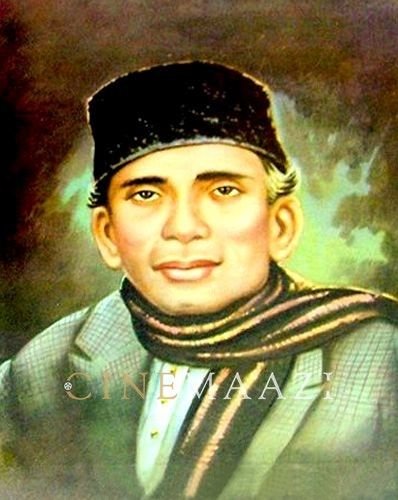Firoz Deen Sharaf

Subscribe to read full article
This section is for paid subscribers only. Our subscription is only $37/- for one full year.
You get unlimited access to all paid section and features on the website with this subscription.
Not ready for a full subscription?
You can access this article for $2 , and have it saved to your account for one year.
- Born: 1898 (Tola Nangal Village, Ajnala, Amritsar)
- Died: 11/03/1955 (Lahore)
- Primary Cinema: Punjabi
- Parents: Veeru Khan
Firoz Deen Sharaf was not only a great Punjabi poet but also excelled as a lyricist in Punjabi films. In a period rife with religious conflict, Sharaf’s writings emanated from deep within the Punjabi psyche. Punjabis owe profound gratitude to Firoz Deen for his phenomenal contribution to Punjabi literature. A devoted Punjabi, he wished for the development and success of the other tongue. Due to his sweet voice, he was called ‘the nightingale of Punjab’. Firoz Deen was a trade unionist and freedom fighter. He wrote poems on Hindu-Muslim unity, patriotism, social reforms, freedom and historical personalities.
Firoz Deen Sharaf was born in a Rajput family of Tola Nangal village (Ajnala Tehsil, Amritsar) in 1898. His father Veeru Khan was a policeman with Railway Police. Firoz Deen was admitted to a primary school in his village but having little interest in regular studies. He left the school after two years and went to his maternal house in Lahore. In the free environment of Lahore, he got interested in Urdu Sher-o-Shayri and he started learning Shayri under the tutelage of Ustad Muhammad Ramdan Hamdam.
He became proficient in writing folk songs. The gramophone companies recorded his folk songs, which became popular among the masses. Apart from being a star Punjabi poet in 1930s, Firoz Deen became popular among the film-goers for his heart-wrenching songs. His popularity reached the film world and K. D. Mehra, father of Punjabi Cinema, gave him a break as a lyricist in Punjabi film Heer Sayal (1938). Firoz Deen wrote all the 18 songs of this film to the melodious tunes of Master Dhumi Khan. The song Sohna deasan andar des Punjab ni sayyio was sung so mystically by baby Noor Jehan that this became an anthem for the land of five rivers. The success of the film created waves in the entire film world.
In his next film Sassi Punnu, K.D. Mehra again relied upon Firoz Deen and he wrote a series of hit melodious songs like Punnu diye moorte tu munhon; Hovein tun channa asmani and Mere babul da mukhra pyara etc. Firoz then wrote a popular comedy song Rabb di janab wichon eho dil mangda for Dulla Bhatti (1940). After working with K.D. Mehra and R.L. Shorey, he was approached by Dalsukh M. Pancholi to write songs of film Chaudhary (1941). Songs of Chaudhary like Zulfan kaale naag; Bas vedhol na tere naal bolna; Chham…dekho…ehdi kaisi sohni chaal..; etc. topped the musical charts and helped Firoz Deen to establish himself as a formidable lyricist of Punjabi films. Firoz Deen wrote some memorable melodies like: Phulaanda scent leyaa; Raatan kaaliyan kallhi; Phull hoven tudaal; under the baton of Pandit Gobindram for the film Nikkhatoo(1943).
After the partition, Sharaf went to Pakistan. He also wrote a poem in Punjabi in praise of Jinnah.He got the chance to write five songs for the film Mundari. But real success came to him with the release of first Pakistani Punjabi movie Chan Wey for which he wrote 11 out of 12 songs. Noor Jehan’s lilting melody Tere mukhde da kala kala tilve created ripples on both sides of the border. He wrote two memorable songs Ghadi ghadi bujh kena jag; Je hanj hoo suk jaande for the first Indo-Pak production film Billo.
His works capture the early twentieth-century struggle of Akali Sikhs to retrieve their sacred shrines from the control of the decadent hereditary custodians(Mahants of Dera). Sharaf recalled the Jallianwallah V Bagh, Amritsar atrocities committed by the British Brigadier-General Reginald Dyer.He wrote a revolutionary book Dukhan De Keerney (Grieving over People’s Suffering) in 1924. The British authorities not only banned his book, but also sentenced him to rigorous imprisonment for one year. His book Sharadha De Phull (Punjabi) was published in 1930.
Firoz Deen had written 35 literary and religious books in his lifetime. His most widely acclaimed writings include Dukhan De Keerne, Noori Darsan, Sunehri Kalian, Hijar Di Agg, Shiromani Shaheed, Nabian Da Sardar, SharafHulare, SharafUdari, SharafSunehe, Jogan and Heer Sayal (Play) etc. Most widely acclaimed works Nuri Darashana (Punjabi) by Firoz Deen Sharaf was republished in 1968. Four editions of Sharapha Rachanawali (Punjabi) came out in 1973. The complete works of a Panjabi poet Lalan Dian Larian(Punjabi) by Firoz Deen Sharaf was published in 1978. In 1953, PEPSU Government accorded him the title of Shiromani Kavi. Punjabi University, Patiala declared his book Sunhari Kalian as the best literary creation.
He was married thrice and his children and grandchildren live in Lahore. Firoz Deen Sharaf left on his eternal journey on 11 March 1955.







.jpg)



